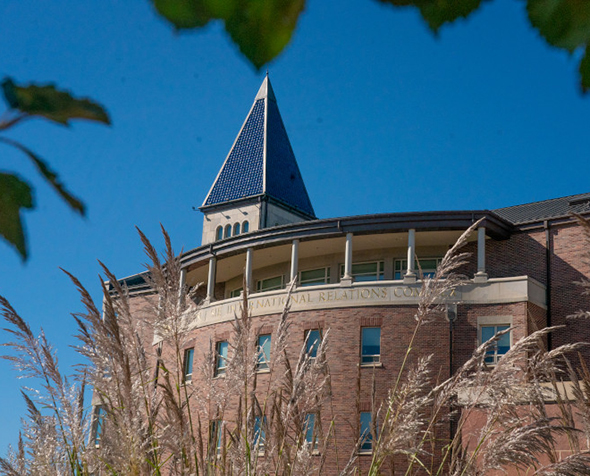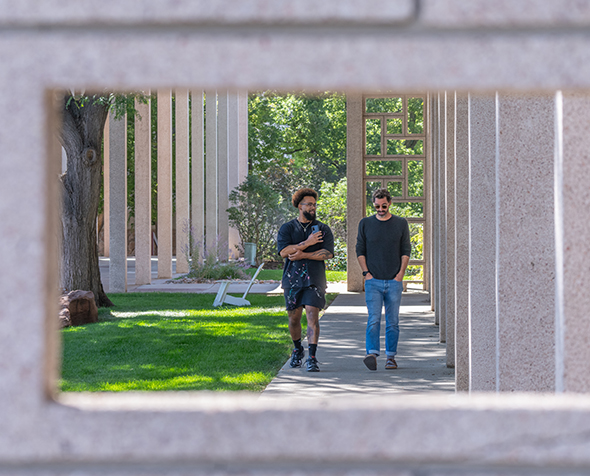Civil Discourse in Action: DU’s Colorado Project Addresses Sustainable Economic Growth
The Colorado Project is setting its sights on strengthening Colorado’s economy through inclusivity and unity.

The Colorado Project seeks to reduce polarization, strengthen democracy and find solutions to the tough issues facing Colorado by harnessing the power of civil discourse. This year-old initiative is housed in the Douglas and Mary Scrivner Institute of Public Policy at the Josef Korbel School of International Studies. In early March, the Project released a report proposing a strategy for sustainable and inclusive economic growth in Colorado, addressing topics like water, energy, jobs and housing.
“The Colorado Project is an effort for us to bring all Coloradans together to take on the most important questions of our state while committing to the hard work of listening and learning even when we may disagree,” said Dean Fritz Mayer, Korbel School of International Studies who launched the project as a flagship effort for the school based on work he previously led in North Carolina.
Starting in July 2023, the Project’s 33 members met eight times, virtually and in small groups, to develop recommendations for an economy that lifts all boats when the Colorado economy grows.
“On the surface, our economy looks good but historically our economic growth hasn’t benefitted every segment of the population the same, particularly people of color and people living in poverty,” says Rebecca Montgomery. She is the former director of democracy and civil discourse initiatives within Scrivner and was the staff facilitator for the Project. “Rural communities haven’t recovered since the recession of 2008. Up until now, leaders have worked on these issues in silos but there is potential for political alignment we are not seeing if we can break out of these silos.”
Landon Mascareñaz believes the group succeeded in doing that. He was a committee member and has been brought on as a consultant to replace Montgomery, who has since left the Project. He currently serves as the chair, State Board for Community Colleges and Occupational Education and is the co-founder of The Open Systems Institute. The civil discourse process used by the Project left him enthusiastic about the Project’s potential and results.
“I had a really incredible experience,” he says. “I loved the partnership, the facilitation and really great ways we could take the content and move it to the next level.”
The group’s members were selected to ensure diverse viewpoints were represented through geography and backgrounds: industry, business, non-profits, rural, urban, racial, water, energy, workforce, housing, land use and others. Only a couple held elected office.
While civil discourse was the rule of the day, the conversations weren’t easy. The group adopted four rules to keep talks civil:
1. assume positive intent
2. come to every meeting and engage meaningfully
3. keep all conversations confidential
4. base all your contributions in facts, research or practical experience
“We held each other to these values on those constructs we made at the beginning,” says Lisandra Gonzales, one of three co-chairs and chief executive officer of Rocky Mountain Partnership.
These points kept discussions on track, especially when talks became tough, as they did the first day. Ideas about equity and inclusion provided a tall first hurdle.
“How do you deal with racial issues in parts of the state where race is not a prominent issue?” says Steve ErkenBrack, co-chair and chief executive officer of the Buell Foundation. “That was very tense for a bit but we worked through that because we realized it’s all about inclusion. Parts of rural Colorado also feel they have not always been included.”
Gonzales says that talk revealed something else. Definitions are shaped by people’s personal experiences, giving language shades of meaning beyond the dictionary. In the end, she says people generally agreed on what something meant but used different words to describe it.
“Even if you hear something that is off-putting,” ErkenBrack says, “rather than react immediately, make sure the person is really saying that. We all have biases. These biases we all bring to the human experience are not inherently negative, but you have to face them and recognize them in yourself. We ended up with a candid process and there was a unanimity of where we wanted to get.”
Questions were not left to fester unresolved. “If something felt off, we connected to make sure we had real conversations,” Gonzales says. “We didn’t lose anyone for the sake of not having those accountability conversations.”
The issues often emerged from smaller working groups, were introduced to the larger group, discussed, sent back, reworked, reintroduced and accepted, or not, usually by consensus.
“Can you live with this in the end? That’s where we had the ultimate buy-in,” Gonzales says. “Are you comfortable with your name being associated with this? That is the question we were asking.”
ErkenBrack says that the diversity of the group was its strength, especially as the participants came to realize all the issues were interrelated. Water affects business which affects housing, education, land use, etc. Any single issue brought up others, and the commitment from the group was to create a plan that would benefit the entire state, not just part of it.
“You wind up realizing whatever your own background and expertise is, you have to access other expertise,” ErkenBrack says. “You realize the importance of listening to other people’s expertise.”
Gonzales says the group spent a lot of time “sitting in the dialogue” and listening before decisions were made. “What was most inspiring about this process and gives me the most hope, even for the country,” she says, “by bringing together this vast array of people, what we all committed to was the end result. We were respectful of other opinions.”
“You can’t assemble people from all these diverse backgrounds and expect everybody to think like you,” says ErkenBrack. “We live in an environment of policy that is increasingly contentious and emotional. Bringing together several dozen leaders from different fields and reaching a result and consensus document inspired us to take this back to our day jobs and communities - listening to make progress.”
“We built relationships across ideas and differences. That was so powerful,” Mascareñaz says.
The focus now is on getting the report into the hands of thought leaders. Eventually, a new group will be convened for the Colorado Project to tackle a new topic, yet to be identified, certain to be tough, but the discourse civil.




